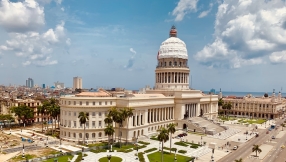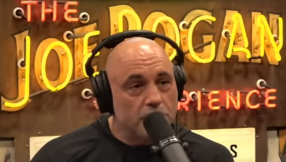Interview: Israel Oyelumade, Star of Anti-Slavery Production 'African Snow'
|PIC1|The play is a first-time collaboration between Riding Lights Theatre Company and York Theatre Royal and is about to wrap up its London West End leg of a nationwide tour before it continues on to Wales.
In it, Equiano comes face to face with John Newton, the slave trader who struggles throughout the production to come to terms with his life of debauchery and trading in African flesh before he makes a dramatic conversion to Christianity and eventually joins the campaign to bring an end to the slave trade.
Although there is no historical proof that the two men met, it is highly probable that they did come face to face with one another at some point as they both moved within the same abolitionist circles.
The play throws up a number of questions about justice, repentance and forgiveness and challenges the audience to think more deeply about not only Britain's role in the slave trade but also about what can be done today to ensure that modern forms of slavery like sex trafficking and child labour, are also eradicated from the world.
Theatre critics have hailed Oyelumade's powerful performance as Equiano and the production has repeatedly performed before packed out theatres during its tour.
Christian Today caught up with Oyelumade to find out more bringing Equiano and the history of the slave trade to life on stage.
CT: Olaudah Equiano was one of the most important black figures in the movement to abolish the slave trade. Did you feel under pressure to get your portrayal of him right?
IO: Not so much pressure but as an actor and as a Christian I wanted to put something across that was very real but very truthful because he was an amazing man and you want him to be remembered as the great man that he was because there was so much about him. He was a real man of passion, a man that wanted truth.
It's just so remarkable to be robbed from his native land at the age of nine or 10, to go through the middle passage, and to have something in him that just kept him going forward.
CT: So you found him as a man very inspirational?
IO: Yes, very.
CT: Did you find it hard to 'become' Equiano given that he is a historical figure and the life that he lived was so extraordinary and incomparable to our lives here in Britain today?
IO: Yes, I suppose it is. The ships are not the way they used to be, the climate is different, the medical facilities are infinitely better, the diet's better, we have space around us. So it was very hard to understand the mindset of what he would have gone through.
But as a Christian I just had to ask God because ultimately God was there. And every time I was praying I was saying, "Lord help me here because I really need to find the heart of this guy."
And the more I read about him and looked at footage, and pictures of slaves in shackles with yokes around their necks and muzzles across their mouths, and read how they were dumped off in the middle of the passage, and read captains' logs that wrote down so matter of factly that "someone gave me a woman today but I just returned her today because she was too long breasted", the more I just thought goodness gracious.
CT: Was it your Christian faith that made you want to play Olaudah?
IO: My introduction to Olaudah Equiano happened in the summer of '99. I graduated from the Royal Academy of Dramatic Arts in '98 and then I was taken on by the Royal Shakespeare Company and I worked on a show called Oroonoko about a slave prince and I was cast in that show and some of my background reading was on Equiano.
It was something that stayed with me and then in 2003 he came back to my mind again. Was I praying about it? I don't know. But I remember there was a moment when his name flashed through my mind again and I wondered why he was coming into my head again. Then that same week I saw a double-page spread in a newspaper on Equiano and it happened to be Black History Month. It was then that I thought maybe God was trying to tell me something. And you know what it is like for Christians, it was like, 'Ok God, what do You want me to do with this information; what do You want me to do now?
So I put it to the back of my mind and then a year later the script of African Snow fell into my hands and I read it and I knew then I was destined to play that and then things started to make sense for me. I just believed there was something about this guy that God knew I would have some chemistry with. I auditioned, as all actors have to, but it was given to me.
CT: So you feel like God was definitely guiding that?
IO: Definitely.
CT: I heard that actors must find something they can connect with in the person they are portraying; otherwise it's very difficult to portray that person. What was it about Olaudah that you connected with?
IO: He's an overcomer and he wanted to put the world to rights. One thing that really comes through in his book is his passion and I am a very, very passionate person about my faith and moral issues that I think that I need to be in place but are not in place in our society. And as an actor I am very passionate about the younger generation. The Prince's Trust made me a youth ambassador when they heard of African Snow and they discovered my heart towards the youth.
And I think what made me connect with him is that, for one thing, we have the same faith but he was a passionate person and someone who would not give up. If he knew something was right then he would stand up for it. He just would not give up. He was whipped, beaten, bruised brutalised, sold by one of his masters, stripped of his award of a soldier. But he was defiant. He just would not give up.
And for me I just thought, 'I love this guy.' I am very stubborn in that way. If I know that something is right morally then I don't care if I am the only one standing for it, I'll stand for it. And he was very much the same and I identified with that and that helped me to understand his character.
He also came from nobility and my family came out of African nobility. So I understand the mindset of being the firstborn because I am the firstborn and I understand the mindset of the one who will take on the chieftaincy and the mantel of royalty. I understand that and the expectation that is put on you, rightly or wrongly.
CT: The play is very powerful. How do you keep your intensity fresh for every performance?
IO: I think it's because it's a story of the heart and because it is something that for me means a lot for people to see it. It has so many messages in it that it really is a story of the heart - which makes it easier and difficult at the same time because a story of the heart means you can't wing it. You have to apply yourself to it.
Some plays you can sit back and let the words do it but the language in this play is prosaic because it is the language of the era, and the style of language is very Shakespearean in the imagery that is given through the writer Murray Watts.
But because it is a play of the heart you've got to play it for all it's worth and once you play it, it lives and breathes. We had two shows yesterday and two shows today. My matinee show I've just finished and I am absolutely exhausted. But I've got one more tonight and I know I'll get the strength to do it because once you are in you just start to go, you cant take your foot off the pedal.
CT: This year is the bicentenary of the abolition of the slave trade. There's been a lot of debate this year about whether the role of black people in their own liberation has been neglected or underplayed. How do you feel about that?
IO: It is very difficult but I think that one of the things we have to do as Afro-Europeans is come to terms with our history and some of our history isn't good. And we are so defensive when someone wants to criticise us as black people in this nation that we don't listen and that is just a lack of humility. The fact of the matter is that we as black people made some huge mistakes.
Yes, we do know that Europeans came into Africa and set up a structure that didn't help Africa and therefore the infighting was helped by the Europeans and their view of how we should live. However, we too as black people have a brain. We know right from wrong. There was slavery but there was slavery before the Europeans encroached on the shores of Africa.
However, the term 'slave' to an African in the1700s and 1800s meant 'servant'. It meant that you would be taken into my village and my village because we have won and we are the stronger tribe and you are the weaker tribe. And not only will you do the menial tasks but we will feed you, you will have accommodation of your own and in time if you prove yourself worthy we may bring you into our tribe and you may actually marry in our tribe. Big difference. A big, big difference.
What happened was that we were ignorant of people as a race. They put a mirror in front of us and when we saw our own reflection we thought it was magic and over time the greed of human nature became something that we perpetuated within our own people. Then they started to see the benefits of that greed and became complicit. But before we became complicit, our view of slavery was not the European idea of slavery.
CT: The play is acted out by an almost entirely black ensemble, with the exception of one white actor as John Newton. It's quite unusual. Are you glad about that?
IO: Yes, very, because the archetype is the other way round. That's the other perspective. But Paul Burbridge, the director, wanted it to be from a black perspective. He wanted John Newton's character to be absolutely pinned to the wall so that wherever he turned it would be a black face. Instead of it being Equiano in a white cast he wanted it the other way round because actually that was how it would have been and that really shows how we as a people were emasculated of our own strength and identity because we outnumbered them by the most outrageous amount and yet they still overpowered us.
CT: What do you want the audience to get out of your performance of Olaudah?
IO: I want them to know that he was a human being. Yes, he was black, but this is a story about human tragedy and hope because Olaudah didn't see the bill pass, he died before it passed, and Wilberforce died the year after it passed.
But it's about hope and people acknowledging that we need to stop airbrushing certain things out of the history of the UK. We need to acknowledge that this is something that we were part of. We were not the best of people in it. We were part of the problem of the slave trade and they have to acknowledge that there were some great heroes.
I think the reason why the Prince's Trust made me an ambassador was because I said Equiano was the first Afro-European role model because he came from Africa to the UK and won the heart of the people. Not only could he talk as eloquently as they could, he dressed just as they did and he went up and down the nation.
And the signatories who signed his book, which gave him the money to produce the book, were the upper echelons of society, the Prince of Wales and the royal family, all the lords and the dukes. They all signed his book because they were fascinated by this man that could tell stories of great feats that they knew to be real and true and here he was standing before them.
CT: So you are looking for Olaudah to become the first of many black role models?
IO: Yes exactly, he has to be. We mustn't forget that William Wilberforce had the heart of the black man and that is why he is an amazing guy. But we mustn't look only at William Wilberforce and forget about everyone else because actually William was the mouthpiece of a very powerful movement. He was the front face of it and that's why we talk about him so much. But Thomas Clarkson, Granville Sharp, James Ramsay, these people were very important in the abolition of the slave trade. So what we have to acknowledge is that it wasn't just William Wilberforce.
Olaudah became the leader of the Sons of Africa. He was the leading figure in the Sons of Africa and the Sons of Africa were a very powerful and educated band of freed men that really gave this movement credibility. We mustn't forget we have some amazing heroes.
CT: So you think the commemorations of the abolition of the slave trade this year will be very influential in giving black role models to the black community?
IO: Absolutely, because that's what we need to do. I am honoured to play this man because I want it to say to people that we've got to do something with our youth. We need to educate the young and we need to tell them they've got great role models.
I did a documentary with the BBC and at the time of this documentary a lot of the gangland killings had come up again. One of the questions I posed to the viewers was, 'Are you telling me that Equiano did all of this and then died for his children to then kill each other with guns?' I don't believe that to be the case and we need to stop having excuses and stop saying, 'Oh, it's because of this and because of that.'
We need to take responsibility for our actions. Yes, admit that we've been wronged, but move on from that. Equiano was a key figure in this nation and so as an Afro-European I have every right to claim some of that inheritance. I am as British as anyone and I have a right to stand strong in this nation.
CT: It seems like this play has made a very large impact on you and like it's going to stay with you long after the end of the play? What are you going to do after this? Any plans?
IO: We finish the UK tour in June and then we would like to take the play to America so we are starting to investigate that and put some feelers out. It would be very exciting if God opens some doors.
Ends
For more information about African Snow, including dates and venues, go to
http://www.ridinglights.org/shows/africans_001.php
To read Christian Today's review of African Snow click HERE to read Christian Today's review of African Snow.













